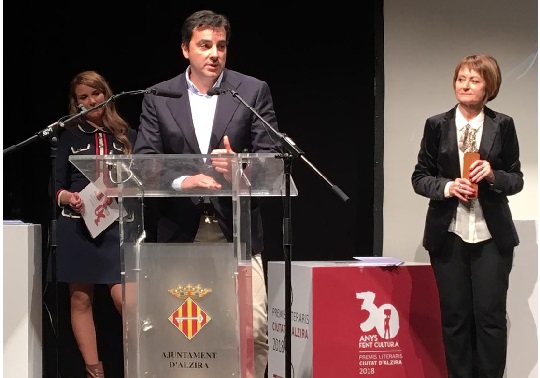An essay on the molecules of life wins the XXIV Estudi General European Award for Scientific Dissemination
- Scientific Culture and Innovation Unit
- November 10th, 2018

Las moléculas de la vida. Breviario para bioquímicos novatos, by biochemist and scientific disseminator David González Jara, is the winning work of the XXIV Estudi General European Award for Scientific Dissemination, endowed with €12,000 by the University of Valencia. Mavi Mestre, rector of the academic institution, has presented this award on Friday night, as part of the XXX Ciutat d'Alzira Literary Awards.
The award is intended to stimulate the creation and dissemination of works that make scientific and technological advances available to the public and also the dissemination of the various branches of knowledge. Written in first person, the winning work analyses relevant aspects about the structure, properties and functions of the molecular mechanisms on which the biological complexity is based and that have made possible the genesis and life on Earth.
Las moléculas de la vida, (‘The Molecules of Life’), by David González Jara, originally presented in Spanish, is a book dedicated to the beauty and complexity of tiny things: the atoms and the begetting molecules of life. Not in vain, the complexity of life on Earth depends on these microscopic elements, which, often, are stripped of their importance.
The Rector of the Universitat de València, Mavi Mestre, has acknowledged that the Ciutat d’Alzira awards mean 30 years rewarding and recognising Valencian literature and research and the dissemination of science: “Today is an important day for Alzira, for the Valencian society, and also for the University of Valencia, since, in addition, we are also involved in these awards”. Mestre, in this sense, has recalled the role of the late Fernando Sapiña, a professor at the Faculty of Chemistry, a member of the Scientific Culture Unit of the UV and a person involved in the dissemination of science for many years. “Disseminating is one of the missions of the University. Not only do we have to work well in teaching and in research, but we also have to make it known, communicate it and that is why dissemination is important to reach society”, said the rector.
“Life and its gigantic complexity sprout from small particles that we call molecules. But we are not deceived, under the homogenising concept of molecules there is a huge, varied and complex universe that engenders life. Knowing life means knowing the molecules that shape it”, highlighted the winner of the XXIV Estudi General European Prize for Scientific Dissemination.
In addition, according to the populariser, science “is the best strategy available to the human being when it comes to finding answers to many of the issues that arise” and scientific dissemination “has the difficult task of making complex things intelligible and transform what is tedious into motivating, so that any individual can access scientific knowledge”.
David González Jara (Ávila, 1974) has a degree in Chemistry and a doctorate in Biochemistry, and has studies in Environmental Sciences. Currently, he is a professor of ESO in the specialty of Biology and Geology at the CEO El Mirador de Sierra de Villacastín, although he has also worked as a university professor and as director of the Experimental Sciences Department of the International University of La Rioja. For more than five years, González Jara dedicated part of his time to scientific dissemination. He has published scientific articles in specialised magazines and general information newspapers such as El País or Diario de Ávila, as well as several university manuals on didactics of experimental sciences. With the popular book El encantador de saltamontes (‘The Grasshopper Whisperer’) he won the Bronze Prism Award for the best original and unpublished scientific dissemination text.
Award jury
The jury of this XXIV edition of the award has been formed by María Dolores Real, vice-rector of Innovation and Transfer, who chairs it; Soledat Rubio, coordinator of the «Sense Fronteres» collection; Xavier Duran, awarded in the XXIII edition of this award; Pascuala García, researcher at the Department of Optics and Optometry; and Juan Francisco Fernández de Guevara, researcher at the Department of Economic Analysis.
To weigh the works, the jury has taken into account scientific interest and coherence, creativity and originality, the clarity of the text and the structure of the text and the correct use of syntax and orthographic rules. The award-winning book will be co-edited by Edicions Bromera and by the Publications Service of the University of Valencia, in the Valencian version, in the «Sense Fronteres» collection.
Ceremony
On the night of Friday, November 9, the winners of the various modalities have collected the trophy designed by Manuel Boix at the Ciutat d’Alzira Literary Awards dinner. The event, led by journalist Maria Fuster and the Valencian group Urbàlia Rurana, was attended by more than 800 people. Among them, representatives of the Consell de la Generalitat Valenciana and the Diputació de València, members of the Valencian Academy of Language, of the Valencian Culture Council, as well as other political leaders, members of the main trade unions and entities such as Escola Valenciana. A total of 242 originals have been presented to this edition, which have opted for a global allocation of €72,000.
















